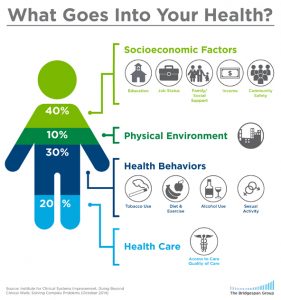3.1.2 The Healthy Body
The World Health Organization (WHO) offers a simple definition of health as “a state of complete physical, mental, and social well-being, and not merely the absence of disease or infirmity” (WHO, 2021). Thus, health refer[s] to the ability to maintain homeostasis (a stable internal state) and to recover from anything that threatens this homeostasis. Health can discussed in terms of mental health, intellectual health, emotional health and social health—all of which reference a person’s ability to handle stress, to acquire skills, to maintain relationships, and to form resources for resiliency and independent living (The Association of Faculties of Medicine of Canada, n.d.).
The following infographic breaks down the various elements that comprise a person’s health—from factors outside one’s control, to the choices we all make every day. You may be surprised to see that socioeconomic factors like your education, income, job, family and community safety have the most significant impact on your health. The second most important aspect is your choices: behaviours like smoking, drinking, sexual activity, diet and exercise. Then, your access to high-quality health care has somewhat of a significant impact. Finally, the least impactful aspect of health is the physical environment around you—including exposures to harmful substances and unsafe or unclean living conditions.

Practice Makes Perfect
For each circle in the infographic above, jot a few notes about your own health factors. If you are able, it is highly recommended that you indicate positive health factors in green and negative health factors in red. Once you are done, look at your completed personal health profile and consider your answers to the following questions:
- Do you see mostly negative (red) or mostly positive (green) factors on your page?
- Circle the negative factors that you can change. What actions can you take to change them to positive factors?
- Look at the negative factors that you cannot change. What would need to improve in society or the world to change these factors to positives?
Would you like to make some changes? The One You quiz from Britain’s National Health Service may help point you in the right direction. But there is no substitute for discussing your health with a trained medical professional.
Media Attributions
- What Goes Into Your Health? © The Bridgespan Group is licensed under a CC BY (Attribution) license

